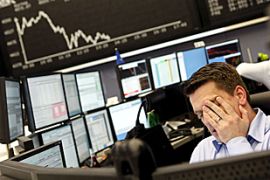World growth ‘lowest in 60 years’
Banks may lose $2.2 trillion as worst falls in 60 years hit world economy, IMF says.

Meanwhile, the International Labour Organisation has predicted that up to 50 million people may lose their jobs in 2009.
The UN agency says the figure is a worst case scenario, but it expects global job losses to be between 18 and 50 million this year.
Around Asia, evidence is emerging to support the ILO’s claim.
In China, a communist party official estimates that 40-million migrant workers will be searching for work as the country’s economic growth begins to slow.
In Japan, the 12 largest car manufacturers plan to cut a total of 25,000 jobs by the end of March.
And in the Philippines, up to 300,000 people are in danger of losing their jobs by the end of June.
‘Uncertain outlook’
In its reports, the IMF said: “Despite wide-ranging policy actions, financial strains remain acute, pulling down the real economy.”
It warned its projections were made in a “highly uncertain outlook” and that “the timing and pace of the recovery depend critically on strong policy actions”.
“A sustained economic recovery will not be possible until the financial sector’s functionality is restored and credit markets are unclogged,” the Washington-based organisation said.
The United States, the epicentre of the financial crisis, was predicted to endure a 1.6 per cent contraction, well down on the organisation’s prior estimate of 0.9 per cent.
Japan’s economy would shrink by 2.6 per cent in 2009, instead of the former estimate of 0.2 per cent, while the 27-member eurozone economy would hit a wall, suffering a two per cent contraction after growing one per cent in 2008.
The previous 2009 estimate was for a 0.5 per cent contraction.
The IMF offered some light at the end of the tunnel, saying it saw a gradual recovery in the global economy in 2010 of growth of three per cent, spurred by “continued efforts to ease credit strains as well as expansionary fiscal and monetary policies”.
‘Toxic effects’
Developing countries were forecast to have relatively weak growth of 3.3 per cent in 2009, about half the 6.3 per cent expansion of last year.
China would remain the world’s fastest-growing economy with a 6.7 per cent increase, down from nine per cent in 2008.
India’s economic growth would slow to 5.1 per cent after 7.3 per cent.
The IMF cautioned that “the uncertainty surrounding the outlook is unusually large”.
“Downside risks continue to dominate, as the scale and scope of the current financial crisis have taken the global economy into uncharted waters,” the organisation said.
“The main risk is that unless stronger financial strains and uncertainties are forcefully addressed, the pernicious feedback loop between real activity and financial markets will intensify, leading to even more toxic effects on global growth.”